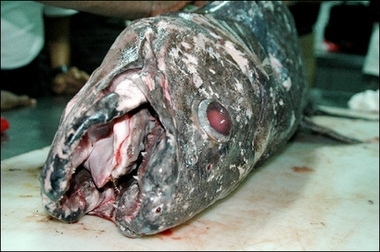Scientists excited by Indonesian-caught coelacanth
(Agencies)Updated: 2007-07-30 09:38
MANADO, Indonesia - Two months ago Indonesian fisherman Justinus Lahama caught a fish so exceptional that an international team of scientists rushed here to investigate.
Last May 19, Lahama and his son Delvy manoevred their frail canoe into the Malalayang river, on the outskirts of Manado, on northern Sulawesi island. Like any other morning, they rowed out to sea and fished within 200 metres (yards) of the beach.
"I very quickly unrolled the usual trawl line with three hooks, about 110 metres (yards) long, and at the end of three minutes, I felt a large catch," Lahama recounts.
The pull was strong: "I had painful arms - I felt such a resistance, I thought that I was pulling up a piece of coral."
After 30 minutes of effort under the searing tropical sun, he finally saw a fish swishing at a depth of about 20 metres (65 feet).
"The sea was very calm this day. There was no wind, no clouds, no current. The water was very clear. The fish let itself be drawn in from there," he says.
He thought he was dreaming, he said, when he saw the creature at the end of his line.
"It was an enormous fish. It had phosphorescent green eyes and legs. If I had pulled it up during the night, I would have been afraid and I would have thrown it back in," he exclaims.
Coelacanths, closely related to lungfish, usually live at depths of 200-1,000 metres (656-3,200 feet). They can grow up to two metres (6.5 feet) in length and weigh as much as 91 kilogrammes (200 pounds).
Lahama, 48, has fished since he was 10 years old, like his father and his grandfather before him. But he was unlikely to have ever run into this "living fossil" species, as scientists have dubbed the enigmatic fish.
Lahama's catch, 1.3 metres long and weighing 50 kilograms (110 pounds) was only the second ever captured alive in Asia. The first was caught in 1998, also off Manado.
That catch astonished ichtyologists, who until then had been convinced that the last coelacanths were found only off eastern Africa, mainly in the Commoros archipelago. They had been thought to have died out around the time dinosaurs became extinct, until one was found there in 1938.
Their fossil records date back more than 360 million years and suggest that the fish has changed little over that period.
Lahama, who had never even heard of the fish, initially thought of selling his white-spotted catch.
"Considering his weight, I said to myself, this will fetch a good price."
Returning to port, he showed it off to the most senior fisherman, who became alarmed.
"It is a fish which has legs - it should be given back to the water. It will bring us misfortune," he told him. But the unsuperstitious Lahama decided to keep it.
After spending 30 minutes out of water, the fish, still alive, was placed in a netted pool in front of a restaurant at the edge of the sea. It survived for 17 hours.
The local fisheries authorities filmed the fish swimming in the metre-deep pool, capturing invaluable images as the species had only previously been recorded in caves at great depths.
Once dead, the fish was frozen.
After the fisherman was interviewed, French, Japanese and Indonesian scientists working with the French Institute for Development and Research carried out an autopsy on the coelacanth. Genetic analysis is to follow.
The site of capture, so close to the beach and from a depth of 105 metres, had intrigued the scientists. Does the Indonesian coelacanth live in shallower waters than its cousin in the Commoros?
Lahama's fish is to be preserved and will be displayed in a museum in Manado.
|
|
|
||
|
||
|
|

